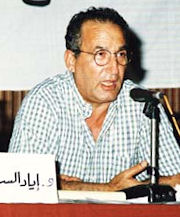Posted February 6, 2008
January 28, 2008
bitterlemons: How has the border breach affected the situation on the ground in Gaza?

Sarraj: Well, most people are not in Gaza at the moment. Some say that almost 700,000 people have been traveling in and out of Egypt. Gaza is flooded with the things that Israel did not allow us to have before and people are swarming to the markets to buy computers, cement, lamps, oil, fuel and even windows. When Israel bombed that building in Gaza last week, all the windows in the surrounding buildings were shattered. With no windows allowed in from Israel, they could not replace them before, but now there are new windows in place.
Everything is available in the market now. From NIS40 a packet, cigarettes are now down to six. There is chocolate for the children. People are almost euphoric since they can get out of the prison, even if it is only for a short respite. People go to El Arish for a picnic, eat fish there and spend a couple of hours. Families sometimes go for the day and come back at night. Gaza is quite a dynamic place now.
bitterlemons: Some see this border breach as a major coup by Hamas. Is that how you read the situation?
Sarraj: I think whether Hamas planned it or not, the movement was instrumental in what happened. Hamas has now again proved that it is a power to be reckoned with and that if you want to talk about rockets, about [captured Israeli soldier Gilad] Shalit, about the crossings or relations with Egypt, then you have to talk with Hamas.
bitterlemons: How is this affecting Hamas’ popular standing?
Sarraj: Hamas lost some of its popularity after the killing of a number of people during the Fateh anniversary demonstrations as well as certain abuses of human rights. But Hamas has become an example for
Palestinians generally, because it suffers no corruption and there is a sense of security in Gaza that was never there before. Finally, people identify with Hamas as a victim of the Israeli blockade. So, while it is a mixed picture on the whole, Hamas has emerged stronger.
bitterlemons: Is there not a possibility that the current situation will lead to Egypt having to take more responsibility for Gaza and Israel taking less?
Sarraj: Of course. There is a definite Israeli plan to return the situation to that prior to the 1967 war, when Gaza was controlled by Egypt. If this happens, it will help Israel to concentrate on the West Bank and gradually bring the situation there back to pre-1967. It is not that simple of course. There are security risks for both Israel and Egypt in doing so. These two powerful parties now have to find a
compromise, and they have to take account of the fact that Hamas is in control.
bitterlemons: Can Egypt afford, politically, to close the border?
Sarraj: I think it is very difficult because doing so risks an uprising in Cairo. The Muslim Brotherhood is very strong there. However, Egypt also needs to consider its own security. Egypt doesn’t want
Palestinian fundamentalist groups to forge links with the bedouin in the Sinai, because together they can become a real headache for Egyptian security and also give Israel a pretext to take direct action in the Sinai.
bitterlemons: Is the Israeli position not equally difficult?
Sarraj: The problem for Israel is the potential security risk and I think Israel will have to come to terms with the fact that Hamas is here to stay and that it has to deal with the movement, maybe through Egypt. I doubt Israel will, but maybe it can forge a deal to at least have a ceasefire.
bitterlemons: Does this include the rocket fire?
Sarraj: If you sit with Hamas and recognize that Hamas is a major player in the game, the question of the rockets can be resolved. But if you don’t, and continue to isolate the movement, the rockets will continue. There is no popular movement against the firing of rockets. How can people oppose this kind of resistance, if there is no hope of ending the occupation? Israel perpetrated a massacre last week in which 19 people, including [Hamas leader] Mahmoud Zahar’s son, were killed. People cheer rockets against Israel and will continue to do so until there is hope that Israel will end the occupation and give Palestinians back their land, their rights and their freedom.
bitterlemons: What are the chances of some kind of Palestinian reconciliation?
Sarraj: Very remote. Even if Palestinians want reconciliation, I think there is strong American resistance to the idea of any dialogue with Hamas. Only if there were leaders of courage and wisdom on both sides and real belief that unity alone would help the Palestinian cause, would reconciliation be possible.
We have to consider that the real player in the game today is the fundamentalist regime in America and I don’t think this border situation will persuade the US to talk to Hamas. Europeans, as far as I can see,
are willing to talk to Hamas as the major power here, but the Americans will not yield. Perhaps the US will even pressure the Egyptians to close the border or perhaps Washington will simply collude with Israel to
continue the siege so people will continue to flood the Sinai.
(Eyad Sarraj is a political commentator and the head of the Gaza Community Mental Health Program.)
